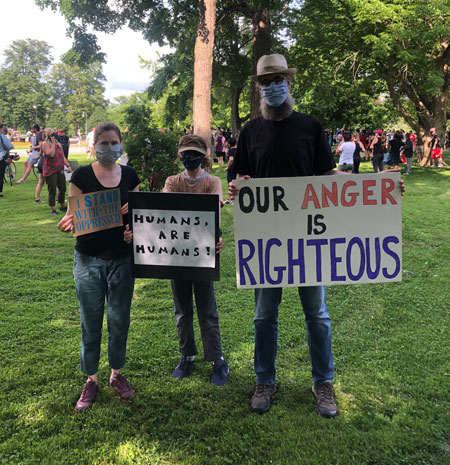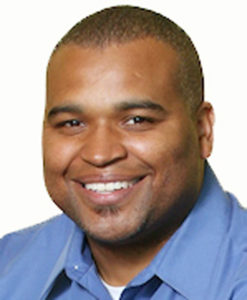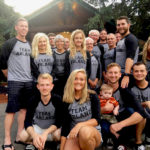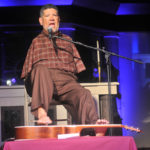
Matthew Coomber, right, associate professor of theology at St. Ambrose University in Davenport, attends a Black Lives Matter peaceful protest with his family June 4 at Vander Veer Park in Davenport.
By Lindsay Steele
The Catholic Messenger
Ryan Saddler, associate vice president for diversity, equity and inclusion at St. Ambrose University in Davenport, hopes issues involving racism become part of the conversation of all businesses and education institutions as they move forward.
“I hope they will take a serious look at any policies, procedures and documents that may lean toward racist behaviors,” said Saddler, who is black. Often, people are not aware that these biases exist within the structure. “We can all look at what we are doing and see what may lean us toward racial justice.”

Although individual and structural racism is an ongoing issue, the death of George Floyd in Minneapolis last month, after a police officer knelt on Floyd’s neck for nearly nine minutes, accelerated the conversation, Saddler said.
St. Ambrose University endeavors to ensure that the voices of minority students, who represented 5 percent of the student body in fall 2019, are heard and supported. Saddler has been working with the university on diversity issues since 2013. Last year, St. Ambrose appointed him as the first associate vice president for diversity, equity and inclusion. “It’s my job to push the envelope,” he said. Fritz Dieudonné, coordinator of the Diversity, Equity and Inclusion office at St. Ambrose, assists Saddler.
The office has worked with the university to implement opportunities for students of color to be at decision-making tables. St. Ambrose has also reevaluated its bias incident process to better address problems as they arise. The university has taken a deep look at diversity hiring, “and we’re going to go deeper,” Saddler said. Staff members have participated in book studies addressing issues related to race. The Black Student Union made a return to campus last fall.
Recent occurrences have prompted the university to consider more ways to address the issue of racism. “We realize we need to step up the efforts, as most places do, and be more intentional. Our aim is to … have these dialogues and conversations in the midst of everything else going on,” Saddler said. The university has been working to include diversity in the curriculum as a graduation requirement, and the university library recently released a multi-media anti-racist resource guide, available at http://libguides.sau.edu/antiracist.
Saddler said that witnessing George Floyd’s death on camera “time and time again” has been traumatic for black individuals. They fear something similar could happen to them if they let their guard down. “It’s triggering,” he said.
He and other staff members have been reaching out to black faculty and staff. “We need to pause and listen to people, have these conversations with individuals to see where they are,” Saddler said. They want to feel as if St. Ambrose is a safe place where they will be supported if they experience discrimination, hate speech and action or other forms of racial trauma. “We’ve assured black students where we stand; I think they need to hear from us that they are supported, not just by black students but by students that see themselves as allies.”
White students and faculty have been present at recent peaceful protests in Davenport. “What I’m hearing from the black community is that they are impressed by the number of white allies,” Saddler said.
Persons wanting to engage in an allyship with the black community should educate themselves on the history of racism in politics, criminal justice systems and housing systems through a variety of resources. He urges people not to make generalizations based on “one black friend’s experience,” and to be sensitive when asking black individuals about their experiences. “Not everyone is in the emotional space right now to do that. Even if you have someone you are (close to), you have to tread lightly or be willing to catch that backlash. Don’t be offended if they aren’t in the space to have that conversation.”
Allies who have taken the time to educate themselves should share that knowledge with family members, older children and other non-black individuals, he said. “Get that knowledge and then begin having conversations.”
SAU president’s letter addresses racism
After the death of George Floyd, a black man who died while in police custody in Minneapolis, St. Ambrose University President Sister Joan Lescinski, CSJ, addressed faculty, staff and students in a letter.
“As members of a university which has valued and promoted the God-given worth and dignity of every person since its founding, all of us at St. Ambrose are heartbroken and angered by the recent tragic events that have further exposed and deepened our nation’s historic racial divide.
We condemn in the strongest terms the actions rooted in bias and hatred that led to the deaths of Ahmaud Arbery, Breonna Taylor, and George Floyd. My heart breaks for the families who mourn their loss, as well as for the many members of our St. Ambrose family harmed daily by the racism and hatred in which these recent deaths are rooted.
I want to assure those St. Ambrose students, faculty, staff and alumni that, while we cannot fully understand your anguish, we, as members of your Ambrosian family, vow to examine our own biases and behaviors going forward so that we can ensure the fully inclusive environment we all deserve.
I am proud to have joined with leaders of six other Quad Cities-based institutions of higher learning in drafting a statement. It expresses our contempt for the ongoing use of deadly force against black Americans by police across the United States. Together, we have pledged to continue to seek and promote real educational solutions to end this behavior.
For example, faculty and students in our own Criminal Justice Department have worked for years to research patterns of bias in policing in Davenport and other Iowa communities, and to educate police and community leaders in ways to eliminate the underlying bias that leads to the unacceptable violation of basic civil and human rights. This is among the significant ways institutions such as ours can create changes in behavior and help eradicate the prejudice that leads to tragedies such as those we mourn today.
Through the grace of God and through the power of love, understanding, and a commitment to educating one another, we can heal, and become a better nation and a single human family. I pray for us all in this painful and difficult time.











